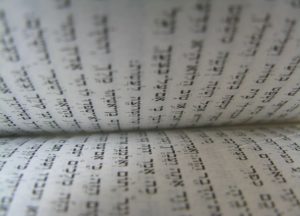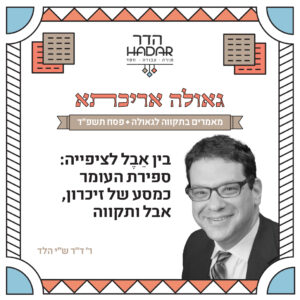אוֹי, עִיר הַדָּמִים!
מאת ר׳ ד"ר ג׳ייסון רוגוף, לזכרו של סמ"ר יובל שהם ז״ל
English version below
אוֹי, עִיר הַדָּמִים! (יחזקאל כד:ו) כך קורא הנביא יחזקאל, בשליחותו של ה', כשהוא מודיע על תחילת המצור על ירושלים בעשרה בטבת. מילים כואבות אלו, המשקפות את כמות הדם שנשפך, מהדהדות בעוצמה בימים אלו, ומעוררות שאלות קשות על אֵבֶל ונחמה.
בהמשך הפרק, אלוהים פונה אל הנביא באופן אישי וטרגי: הוא מודיע לו כי "מחמד עיניו", אשתו האהובה, עתידה למות. זוהי פגיעה שאינה ניתנת לשיעור, אולם הקושי מתעצם כשהוא נדרש שלא להתאבל עליה. "לא תספד ולא תבכה ולא תבוא דמעתך" (שם, טז). למול ההתנהגות התמוהה הזו של יחזקאל אחרי מות אשתו, שואלים העם: "הלא תגיד לנו מה אתה לנו כי אתה עשה?" (שם, יט). ה׳ מסביר כי יחזקאל, בכאבו, נדרש לשמש למופת (שם:כד) לעם ישראל. וכך מסביר כמענה לשאלת העם: "כה אמר ה' אלוהים: הנני מחלל את מקדשי גאון עזכם מחמד עיניכם", וכמו יחזקאל גם העם ימצאו עצמם ללא מנהגי אבלות: "ועשיתם כאשר עשיתי… לא תספדו ולא תבכו ונמקותם בעונתיכם ונהמתם איש אל אחיו" (שם, כב-כג). מגודל הייסורים יהיה עם ישראל לא רק חסר אֵבֶל אלא גם חסר אונים וכל שיוותר לו בעת החורבן הוא השמעת קול – נהמה.
רש"י מפרש את המילים "ועשיתם כאשר עשיתי" כך: "לא תנהגו אבילות כי אין מנחמים לכם, שאין בכם אחד שלא יהיה אָבֵל, ואין אבילות אלא במקום מנחמים." החורבן יהיה כה מוחלט, הכאב כה גדול, עד שלא יישארו מנחמים שיחזיקו את ידי האבלים כי הציבור כולו יהיה באֵבֶל. כשהקהל כולו אָבֵל אין מקום, אין משמעות, אין טעם, אין נמען, למנהגי האבלות. רש״י מצביע על החשיבות הקריטית של קהילה בתהליך האֵבֶל ומסביר לנו פן הכרחי בחווית האבלות: אבלות אינה רק הכאב הפרטי של האדם, אלא תהליך שבו הקהילה תומכת באבלים ומחזקת אותם. כשכולם אבלים אז אין מנחמים, וכשאין מנחמים כל שנותר הוא להשמיע קול נהמה. נראה שללא מנחמים האֵבֶל הופך לתחושת ייאוש מוחלטת, ללא יכולת להתנחם או לעבד את האובדן.
בשנה האחרונה, רבים מאיתנו מרגישים תחושה דומה. הכאב בקהילותינו לעיתים נראה חסר גבול, והאֵבֶל נוגע בכל בית ובכל לב. יש ימים שכל שאפשר לעשות בהם הוא להשמיע נהמה. אולם הפרק מסתיים בשינוי – מגיע הפליט ששרד את החורבן לספר על שהתרחש בירושלים, ויחזקאל מוצא עצמו לא משותק באבלות: "ביום ההוא יפתח פיך את (=עם) הפליט ותדבר ולא תאלם עוד והיית להם למופת…" (שם, כו-כז). יחזקאל ממשיך להיות למופת – אולם הוא מדגים כעת התנהגות אחרת לגמרי. הוא דוגמא למי שמסוגל להתגבר על שיתוק האֵבֶל עצום המימדים ולהתחיל לדבר.
בצד ימי האֵבֶל שנפרס על כל, ישנם ימים אחרים, בהם יש לא רק אבלים אלא גם מנחמים. אלו ימים בהם אנו מקשיבים לאבלים, האלם שלנו ופינו נפתח. מתוך הקושי, אנו לומדים להקשיב, לשמוע את האֵבֶל ולא רק לחוות אותו. יחזקאל עומד בדד, אנו לעומתו מוצאים נחמה בקהילה. אנו נוכחים, תומכים ומחבקים את האבלים – הופכים לשותפים בכאבם וגם – כך אנו מקווים – לנחמה עבורם.
ביום ראשון בבוקר השבוע, עמדו משפחת גולדברג-פולין, שאיבדו את בנם הירש ז״ל, לפני משפחת שהם, שאיבדו את בנם יובל ז״ל, הם הושיטו להם יד מקימה, וקראו את דברי הנביא ישעיהו: "כְּאִישׁ אֲשֶׁר אִמּוֹ תְּנַחֲמֶנּוּ, כֵּן אָנֹכִי אֲנַחֶמְכֶם, וּבִירוּשָׁלַ͏ִם תְּנֻחָמוּ" (ישעיהו ס"ו:י"ג).
המילים "בירושלים תנחמו" מקבלות משמעות כפולה: מתוך ירושלים, עיר הדמים, ובאמצעותה נולדת הנחמה. באמצעות ירושלים ננוחם משום שהחורבן שהגיע לשפל הנורא ביותר לא סיים את סיפורה של העיר. ירושלים נבנתה מחדש – קהילותיה, משפחותיה, רוחה האיתנה. ובתוך ירושלים ננוחם – על ידי הקהילות שממשיכות ובוחרות לבנות חיים מתוך ההריסות.
תודה לר׳ אביטל הוכשטיין על החברותא להבנת הטקסט והרגשות.
"Oh, City of Blood!"
by R. Jason Rogoff
In memory of Yuval Shoham, z”l
"Oh, City of Blood!" (Ezekiel 24:6) cries the prophet Ezekiel, speaking on behalf of God as he announces the beginning of the siege on Jerusalem on the 10th of Tevet. These painful words, reflecting the immense amount of blood that has been shed, resonate powerfully in our days, raising profound questions about mourning and consolation.
Later in the chapter, God addresses the prophet personally and tragically: He informs him that “the delight of his eyes,” his beloved wife, is destined to die. This is an immeasurable blow, yet the pain is compounded when Ezekiel is instructed not to mourn her. “You shall neither wail nor weep, nor let tears run down your eyes” (ibid., 16). In response to Ezekiel’s strange behavior after his wife’s death, the people ask: “Will you not tell us what this is to us, that you act this way?” (ibid., 19). God explains that Ezekiel, in his pain, is destined to serve as an example (ibid., 24) to the people of Israel. Answering the people’s question, Ezekiel says: “Thus says the Lord God: Behold, I will profane my sanctuary, the pride of your strength, the delight of your eyes.” And, like Ezekiel, the people will also be deprived of traditional mourning practices: "You will do as I have done… You shall not mourn or weep but shall waste away because of your sins and groan to one another" (Ezekiel 24:22–23). The suffering will be so profound that the people of Israel will be left not only without rituals of mourning but also without strength and without words. All that will remain for them in the face of destruction will be the sound of groaning.
Rashi interprets the words “and you shall do as I have done” as follows: “You shall not practice mourning, for there will be no comforters for you, since there will not be a single person among you who will not be in mourning, and mourning only exists where there are comforters.” The destruction will be so absolute, the pain so overwhelming, that there will be no one left to console the bereaved, for the entire community will be in mourning. When the entire community is mourning, there is no place, no meaning, no reason, no address for the customs of mourning.
Rashi highlights the critical importance of community in the mourning process and teaches us an essential aspect of the mourning experience: mourning is not only the individual’s private pain, but a process in which the community supports and strengthens the mourners. When everyone is grieving, there are no comforters, and when there are no comforters, all that remains is to utter a moan. Without comforters, mourning turns into a state of absolute despair, leaving no room for solace or the ability to process the loss.
In the past year, many of us have felt a similar sense of loss. The pain in our communities often seems boundless, and mourning touches every home and every heart. There are days when all we can do is moan.
However, the chapter ends with a shift – a survivor of the destruction arrives to tell what happened in Jerusalem, and Ezekiel finds himself no longer paralyzed by grief. "On that day your mouth will be opened to the survivor, and you will speak and no longer be silent. So you shall be an example for them…" (Ezekiel 24:26–27). Ezekiel continues to serve as an example – but now, he models a different kind of behavior. He demonstrates the ability to move beyond the paralysis of overwhelming grief and begin to speak.
In contrast to the prophet's isolation, we find solace in our communities. While there are days of overwhelming grief, there are also other days, when there are not only mourners but also comforters. These are the days when we open our ears and our mouths, when we listen to the mourners and allow them to speak. From the difficulty, we learn to listen, to hear the mourning, and not just to experience it. We are present, we support and embrace the mourners – becoming partners in their pain and also, we hope, a comfort for them.
This past Sunday morning, the Goldberg-Polin family, who lost their son Hersh, z”l, stood before the Shoham family, who lost their son Yuval, z”l. They reached out a hand of comfort and read the words of the prophet Isaiah:
"As one whom his mother comforts, so will I comfort you; and you shall find comfort in Jerusalem" (Isaiah 66:13).
The words “in Jerusalem you shall be comforted” have a double meaning: from Jerusalem, the city of blood, and through it, comes consolation. Through Jerusalem we will be comforted because the destruction that reached its most terrible low did not end the city’s story. Jerusalem was rebuilt – its communities, its families, its steadfast spirit. And from Jerusalem we will be comforted – by the communities that continue and choose to build life from the ruins.
With deep gratitude to R. Avital Hochstein for her hevruta in understanding both the text and the emotions.








